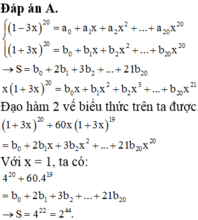Khai triển đa thức: 1 - 3 x 20 = a 0 + a 1 x + a 2 x 2 + . . . + a 20 x 20 Tính tổng: S = a 0 + 2 a 1 + 3 a 2 + . . . + 21 a 20
A. 2 44
B. 4 23
C. 3 20
D. 5 18
Hãy nhập câu hỏi của bạn vào đây, nếu là tài khoản VIP, bạn sẽ được ưu tiên trả lời.



\(A=\left(x-a\right)^2.\left(x+a\right)^2\) =\(\left[\left(x-a\right)\left(x+a\right)\right]^2\)
= \(\left(x^2-a^2\right)^2\) = \(x^4-2x^2a^2+a^4\)
\(B=\left(1+a\right)\left(1-a\right)\left(1+a^2\right)\left(1+a^4\right)\) = \(\left(1-a^2\right)\left(1+a^2\right)\left(1+a^4\right)\)
= \(\left(1-a^4\right)\left(1+a^4\right)\) = \(1-a^8\)

Gặp dạng hệ số đằng trước giống chỉ số của số hạng thế này thì cứ đạo hàm
\(\left(1+x+x^2\right)^{20}=a_0+a_1x+a_2x^2+...+a_{40}x^{40}\)
Đạo hàm 2 vế:
\(\Rightarrow20\left(1+x+x^2\right)^{19}\left(1+2x\right)=a_1+2a_2x+3a_3x^2+...+40a_{40}x^{39}\)
Cho \(x=1\) ta được:
\(20.3^{19}.3=a_1+2a_2+3a_3+...+40a_{40}\)
\(\Rightarrow T=20.3^{20}\)

A(0)=9 => a.0^2+b.0+c = 0
=> c=0
A(1)= a.1^2+b*1+0=20
=> a + b = 20(1)
A(-2)=7 => a(-2)^2+b*(-2)+0=7
=> 4a-2b=7
=> 2(2a-b)=7
=> 2a-b=3,5(2)
Từ (1) và (2) suy ra
a+b+2a-b=23,5
3a=23,5
=> a=47/6
=> b= 73/6
A(0) = 9 suy ra a . 0^2 + b * 0 + c = 0
Suy ra c = 0
A(1) = a . 1^2 + b*1 + 0 = 20
Suy ra a + b = 20 (1)
A(-2) = 7 suy ra a (-2)^2 + b * (-2) + 0 = 7
Suy ra 4a - 2b = 7
Suy ra 2( 2a - b )
Suy ra 2a - b = 3,5 (2)
Từ (1) và (2) suy ra a + b + 2a -b = 23,5
3a = 23,5
Suy ra a = 47/6
b = 73/6

Câu hỏi của Nguyễn Minh Vũ - Toán lớp 7 - Học toán với OnlineMath
Bạn tham khảo ở link trên.

Ta có:
f ( 1 ) = \(a_0+a_1+....+a_{2017}\)
mà f ( x) = \(\left(x+2\right)^{2017}\)
=> \(S=f\left(1\right)=3^{2017}\)

Bài 2:
a) \(x^2+y^2-9-2xy\)
\(=\left(x^2-2xy+y^2\right)-3^2\)
\(=\left(x-y\right)^2-3^2\)
\(=\left(x-y-3\right)\left(x-y+3\right)\)
b) \(4x^2-5x-9\)
\(=4x^2+4x-9x-9\)
\(=4x\left(x+1\right)-9\left(x+1\right)\)
\(=\left(x+1\right)\left(4x-9\right)\)
\(\left(2x-3\right)^2-\left(4x-1\right)\left(x+2\right)=4x^2-12x+9-4x^2-7x+2=-19x+11\)
\(\left(3x+2\right)\left(3x-2\right)-\left(3x-1\right)^2=9x^2-4-9x^2+6x-1=6x-5\)
\(x^2+y^2-9-2xy=\left(x-y\right)^2-9=\left(x-y-3\right)\left(x-y+3\right)\)
\(4x^2-5x-9=\left(4x-9\right)\left(x+1\right)\)
\(\left(x-3\right)^2-\left(x-1\right)\left(x-2\right)=5\Leftrightarrow x^2-6x+9-x^2+3x-2=5\)
\(\Leftrightarrow-3x=-2\Leftrightarrow x=x=\frac{2}{3}\)
\(3x^2+5x-8=0\Leftrightarrow\left(x-1\right)\left(3x+8\right)=0\)\(\Leftrightarrow\orbr{\begin{cases}x=1\\x=-\frac{8}{3}\end{cases}}\)

Bài 1:
a, x2-3xy-10y2
=x2+2xy-5xy-10y2
=(x2+2xy)-(5xy+10y2)
=x(x+2y)-5y(x+2y)
=(x+2y)(x-5y)
b, 2x2-5x-7
=2x2+2x-7x-7
=(2x2+2x)-(7x+7)
=2x(x+1)-7(x+1)
=(x+1)(2x-7)
Bài 2:
a, x(x-2)-x+2=0
<=>x(x-2)-(x-2)=0
<=>(x-2)(x-1)=0
<=>\(\orbr{\begin{cases}x-2=0\\x-1=0\end{cases}}\)<=>\(\orbr{\begin{cases}x=2\\x=1\end{cases}}\)
b, x2(x2+1)-x2-1=0
<=>x2(x2+1)-(x2+1)=0
<=>(x2+1)(x2-1)=0
<=>x2+1=0 hoặc x2-1=0
1, x2+1=0 2, x2-1=0
<=>x2= -1(loại) <=>x2=1
<=>x=1 hoặc x= -1
c, 5x(x-3)2-5(x-1)3+15(x+2)(x-2)=5
<=>5x(x-3)2-5(x-1)3+15(x2-4)=5
<=>5x(x2-6x+9)-5(x3-3x2+3x-1)+15x2-60=5
<=>5x3-30x2+45x-5x3+15x2-15x+5+15x2-60=5
<=>30x-55=5
<=>30x=55+5
<=>30x=60
<=>x=2
d, (x+2)(3-4x)=x2+4x+4
<=>(x+2)(3-4x)=(x+2)2
<=>(x+2)(3-4x)-(x+2)2=0
<=>(x+2)(3-4x-x-2)=0
<=>(x+2)(1-5x)=0
<=>\(\orbr{\begin{cases}x+2=0\\1-5x=0\end{cases}}\)<=>\(\orbr{\begin{cases}x=-2\\-5x=-1\end{cases}}\)<=>\(\orbr{\begin{cases}x=-2\\x=\frac{-1}{-5}\end{cases}}\)<=>\(\orbr{\begin{cases}x=-2\\x=\frac{1}{5}\end{cases}}\)
Bài 3:
a, Sắp xếp lại: x3+4x2-5x-20
Thực hiện phép chia ta được kết quả là x2-5 dư 0
b, Sau khi thực hiện phép chia ta được :
Để đa thức x3-3x2+5x+a chia hết cho đa thức x-3 thì a+15=0
=>a= -15